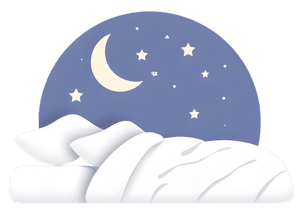Improving nightly rest can profoundly influence your overall well-being. Adopting strategies that prioritize sleep hygiene enhances relaxation and promotes better health.
Research shows that maintaining a consistent sleep routine aligns with your circadian rhythm, fostering more rejuvenating nights.
Incorporating relaxation techniques before bed assists in alleviating stress, calming the mind for slumber.
Optimizing your sleep environment with minimal disturbances is paramount for quality rest. Explore utilizing power naps during the day to refresh your focus and energy levels.
Collectively, these adjustments contribute to remarkable improvements in your overall well-being.
Click here to learn more about: bettersleephq.com
Understanding Sleep Quality Enhancements
Enhancing overall well-being often relates to improving nightly rest. Recent studies indicate that sleep deprivation can result in various negative health outcomes affecting cognitive abilities and emotional balance.
Effective sleep efficiency can be attained through simple yet impactful adjustments to one’s bedtime routine.
Prioritizing a calming atmosphere can facilitate restorative sleep phases, allowing both the body and mind to rejuvenate.
Integrating mindfulness practices and deep breathing exercises promotes relaxation, significantly improving the sleep cycle. Optimal light exposure during the day helps regulate circadian rhythms, fostering a natural sleep-wake pattern.
Identifying personal sleep disorders is essential so individuals can adopt tailored strategies for enhanced nightly rest. Each of these components contributes prominently to achieving greater sleep quality enhancements.
How Does Sleep Hygiene Impact Health
Exploring the connection between nightly routines and overall wellness reveals significant insights. Recent sleep studies illustrate how optimizing nighttime habits can enhance well-being remarkably.
Implementing effective presleep rituals can significantly reduce stress and improve sleep quality.
Findings indicate a strong link between consistent sleep patterns and decreased risks of sleep apnea.
Creating a suitable environment, free from ambient noise, is crucial for restorative sleep. Utilizing sleep tracking tools can offer valuable insights into personal sleep habits and assist in establishing a healthy routine.
Adopting an optimal position during sleep also plays a role in enhancing physical health and mental clarity, which in turn improves daily functioning.
Nightly Routines and Wellness
- Optimizing nighttime habits can enhance overall well-being significantly.
- Consistent sleep patterns are linked to reduced risks of sleep apnea.
- A suitable sleep environment, free from noise, is essential for restorative sleep.
- Utilizing sleep tracking tools can help establish a healthy sleep routine.
The Role Of Circadian Rhythm In Restorative Sleep
The intricate dance of biological processes governs our ability to achieve restorative sleep. Research highlights how disruptions to this rhythm can significantly increase sleep latency, thereby impeding daily functions.
Studies indicate that consistent sleep schedules are essential for enhancing REM and nonREM sleep quality, leading to improved overall well-being.
Additionally, exposure to sunlight during daytime hours optimally supports these rhythms, contributing to effective sleep consolidation.
Implementing strategies such as temperature control in your sleeping environment can enhance the restorative properties of slumber. In summary, aligning your daily routine with these biological rhythms is fundamental for achieving quality sleep health.
Exploring Melatonins Effects On Sleep Duration
Recent studies highlight the influence of melatonin on sleep metrics, revealing its importance in achieving restorative rest. Prominent findings from sleep science suggest this supplement may enhance overall sleep quality for diverse populations.
Positive health benefits often emerge from its consistent use, particularly among individuals experiencing insomnia.
Research indicates that timing and dosage play significant roles in the effectiveness of melatonin for sleep effects.
Tailored recommendations are necessary to ensure optimal results while incorporating this supplement into sleep routines. Individual responses to melatonin vary, suggesting lifestyle changes may enhance sleep outcomes even further.
Recognizing these factors contributes to maximizing melatonin’s potential benefits in improving sleep duration.
Melatonin and Sleep
- Melatonin supplementation has been shown to improve sleep quality across various demographics.
- Consistent use of melatonin is particularly beneficial for individuals suffering from insomnia.
- Research emphasizes the importance of timing and dosage for maximizing melatonin’s effectiveness.
- Individual lifestyle adjustments can further enhance the positive effects of melatonin on sleep duration.
Can Relaxation Techniques Improve Sleep Efficiency
Recent research shed light on the role of various restorative practices in enhancing sleep quality. Mindfulness meditation, progressive muscle relaxation, and other techniques foster a significant relaxation response, promoting a serene environment conducive to rest.
Analysis of sleep patterns from multiple studies reveals that individuals who consistently engage in these practices experience better sleep outcomes and improved overall wellness.
Incorporating tailored bedtime practices into a nightly routine can lead to profound benefits for those struggling with insomnia solutions.
With numerous resources now accessible, individuals can easily take steps to blend relaxation with therapeutic effects, facilitating a more restful night’s sleep.


